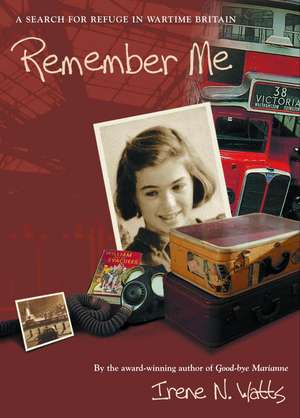Remember Me: A Search for Refuge in Wartime Britain
Autor Irene N. Wattsen Limba Engleză Paperback – 31 aug 2000 – vârsta de la 10 ani
Vezi toate premiile Carte premiată
Sydney Taylor Book Award (2000)
At first Marianne is desperate. She does not speak English, she is not welcome in her sponsors’ home, and, most of all, she misses her mother terribly. As the months pass, she realizes that she cannot control the circumstances around her. She must rely on herself if she is to survive.
In this exciting companion to Good-bye Marianne, Irene N. Watts has created a memorable character, and a story that is ultimately about hope, not war. Based on true events, this fictional account of hatred and racism speaks volumes about history and human nature.
Preț: 46.15 lei
Nou
Puncte Express: 69
Preț estimativ în valută:
8.83€ • 9.24$ • 7.35£
8.83€ • 9.24$ • 7.35£
Carte indisponibilă temporar
Doresc să fiu notificat când acest titlu va fi disponibil:
Se trimite...
Preluare comenzi: 021 569.72.76
Specificații
ISBN-13: 9780887765193
ISBN-10: 088776519X
Pagini: 192
Dimensiuni: 142 x 193 x 11 mm
Greutate: 0.18 kg
Ediția:New.
Editura: Tundra Books (NY)
ISBN-10: 088776519X
Pagini: 192
Dimensiuni: 142 x 193 x 11 mm
Greutate: 0.18 kg
Ediția:New.
Editura: Tundra Books (NY)
Notă biografică
Irene N. Watts is a storyteller, playwright, drama consultant, and director who has worked throughout Canada and Europe. Although she, too, was born in Germany and left on a kindertransport, Marianne’s story is not an autobiography. Irene Watts lives in British Columbia.
Extras
Marianne asked her, “How did you manage to come over?”
Unconsciously, Miriam replied in her native tongue, “I met Mrs. Smedley in Berlin in 1936. She was on holiday with her husband, for the Olympic Games. I was eighteen. She asked me for directions to her hotel. I walked with her, then she invited me in. I explained it was not allowed because I was Jewish. She took my arm and said, ‘I am an English tourist; no one will stop me.’ So brave! We had coffee in her suite. She told me if I ever wanted to go to England, if things got worse, to write to her. When my father’s business was taken away, and I lost my job as his bookkeeper, my mother told me I should write to Mrs. Smedley. It was an opportunity. I did, and she sponsored me. She is very kind. I make mistakes, but she makes allowances for me. My friend Hannah lives in London too, but she lives in one little room. When she wants a bath, she must pay sixpence for the hot water.” Miriam poured more coffee. “She works in a household where they are mean to her. I think she is often hungry.”
“Why don't the Jews in England do more to help” Marianne burst out in German. “Sorry, Bridget, just this one question.”
Miriam said, “They help all they can, but there are so many of us trying to get out of Europe. Mrs. Smedley says in England less than one percent of the population is Jewish. A few are rich, but most are like us – poor, or immigrants, trying to bring their relatives to England. I’ll keep this paper, Marianne. I might hear of a place for your mother.”
Unconsciously, Miriam replied in her native tongue, “I met Mrs. Smedley in Berlin in 1936. She was on holiday with her husband, for the Olympic Games. I was eighteen. She asked me for directions to her hotel. I walked with her, then she invited me in. I explained it was not allowed because I was Jewish. She took my arm and said, ‘I am an English tourist; no one will stop me.’ So brave! We had coffee in her suite. She told me if I ever wanted to go to England, if things got worse, to write to her. When my father’s business was taken away, and I lost my job as his bookkeeper, my mother told me I should write to Mrs. Smedley. It was an opportunity. I did, and she sponsored me. She is very kind. I make mistakes, but she makes allowances for me. My friend Hannah lives in London too, but she lives in one little room. When she wants a bath, she must pay sixpence for the hot water.” Miriam poured more coffee. “She works in a household where they are mean to her. I think she is often hungry.”
“Why don't the Jews in England do more to help” Marianne burst out in German. “Sorry, Bridget, just this one question.”
Miriam said, “They help all they can, but there are so many of us trying to get out of Europe. Mrs. Smedley says in England less than one percent of the population is Jewish. A few are rich, but most are like us – poor, or immigrants, trying to bring their relatives to England. I’ll keep this paper, Marianne. I might hear of a place for your mother.”
Descriere
Marianne is fortunate. She has escaped the Nazi tyranny on one of the first "Kindertransporte" to Britain. But how will she manage alone? She misses her family and cannot speak English. A story of coming of age, courage, and survival.
Premii
- Sydney Taylor Book Award Notable, 2000
